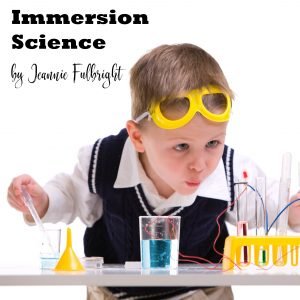Immersion Science
Many educators promote the spiral or survey approach to education, wherein a child is exposed over and over again to minute amounts of a variety of science topics. Those supporting these approaches aim to “expose” the child to science each year giving a bit more information than was given the year before. This method has been largely unsuccessful in public and private schools as the National Center for Education Statistics data indicates that eighth graders are consistently less than 50% proficient in science. There has to be a better way. And there is: immersion science.

Educators assume the young child is unable to understand profound scientific truths. However, presenting a child with scant and insufficient science fails to develop a love for the subject. If the learning is skimpy, the subject seems monotonous. The child is simply scratching the surface of the amazing and fascinating information available in science.
Sadly, students taught in this way are led to believe they “know all about” the subject, when in reality the subject is much richer than they are allowed to explore. That is why I recommend immersion science, where kids, even young children, are given an in depth above their perceived grade level exploration into each science topic. You, the educator, have the opportunity to abandon methods that don’t work so your students can learn in ways that have proven effective. The immersion approach is the way everyone, even young kids, learn best.
This is why we major in one field in college, taking many classes in that field alone. If you immerse your child in one topic of science for an entire year, he will develop a love for the subject and a love for learning in general.
Focus
Additionally, a child who focuses on one subject for an entire year is challenged mentally in ways that develop his or her ability to think critically and retain complex information. This actually benefits the child and gives him an advantage on achievement tests because he is able to make more intelligent inferences about the right answers related to science. On the other hand, a child who is not given the deeper, more profound information will not understand how the scientific world operates.
Apologia employs the immersion science approach to education. My Young Explorer Series takes students on an in depth study of seven topics of science. Students develop a deep understanding of science each year while exploring the topics with hands on, high interest projects and experiments. They not only fall in love with science; they learn about the One who created science!


